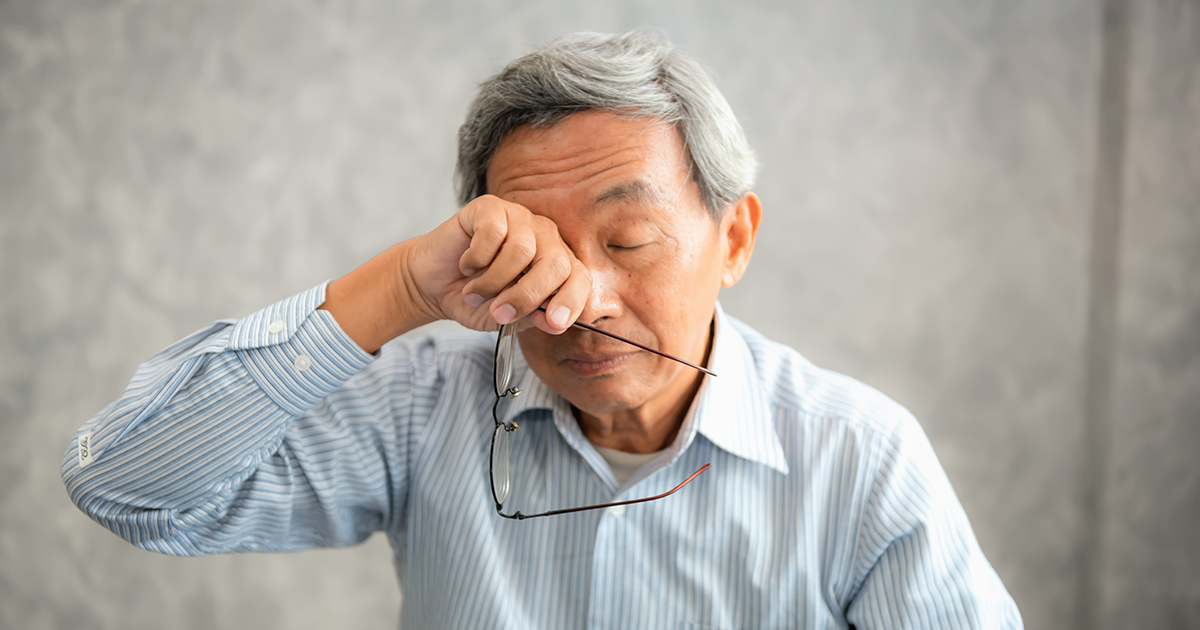As you age, joints and muscles naturally deteriorate. Your eyes do, too.
With the help of your eyecare provider, you can identify and help mitigate age-related vision conditions as the years go by. This starts with a regular eye exam that creates a baseline of your eyesight and monitors your vision condition each year.
In between the exams, people older than 60 also should note vision issues such as not seeing as well when driving at night, having to hold a book closer or further away to read it or noticing that a computer or television screen is blurry.
See an eye care professional right away if you:
- Suddenly cannot see or everything looks blurry
- See flashes of light
- Have eye pain
- Experience double vision
- Have redness or swelling of your eye or eyelid
What You Might Notice
The National Institute on Aging says that common age-related eye conditions include:
Presbyopia – a slow loss of ability to see close objects or small print. Symptoms include headaches or strained, tired eyes. Reading glasses usually fix the problem.
Floaters – tiny specks or that seem to float across your vision. Sometimes they are a sign of a more serious eye problem, such as retinal detachment. This requires care from a qualified eyecare provider.
Tearing – this happens when you are sensitive to light, wind or temperature changes. Wearing sunglasses when outside or using eye drops are helpful. If the condition is related to an infection or a blocked tear duct, you will need to see your eye doctor.
Eyelid problems – this can include red and swollen eyelids, itching, tearing and crusting of eyelashes during sleep and may be caused by blepharitis and treated with warm compresses and gentle eyelid scrubs.
What Diseases and Disorders We See
Cataracts – This happens when cloudy areas in the eye’s lens cause blurred or hazy vision. Our doctors watch for changes over time to see if you would benefit from surgery. Learn More
Dry Eye – This is when you feel stinging in your eye. We recommend using a home humidifier or air cleaner, special eye drops (artificial tears), or ointments. Learn More
Glaucoma – This is from too much fluid pressure inside the eye. It can be treated with prescription eye drops, lasers, or surgery. Learn More
Age-related Macular Degeneration (AMD) – This can harm the sharp, central vision needed to see objects clearly and to do common things like driving and reading. There are treatments for AMD. Learn More
Diabetic Retinopathy – This develops slowly and often has no early warning signs. If you have diabetes, be sure to have a dilated eye exam at least once a year. Laser surgery can sometimes prevent it from getting worse. Learn More
Retinal Detachment – This is when the retina separates from the back of the eye, and is a medical emergency. With treatment, doctors often can prevent loss of vision. Learn More
What You Can Do
Seniors can protect their sight and help control age-related eye issues by doing the following:
- Protect your eyes from too much sunlight by wearing sunglasses that block ultraviolet (UV) radiation and a hat with a wide brim when you are outside.
- Stop smoking.
- Make smart food choices.
- Be physically active and maintain a healthy weight.
- Maintain normal blood pressure.
- Control diabetes (if you have it).
- When using a computer, look away about 20 feet every 20 minutes.
Here at VisionQuest, we can help you keep your eyes healthy through exams, vision correction, vision therapy and much more. Schedule an appointment with us today, and see how much our eye care specialists want the best for you and your vision.

Dr. Chris Browning is a Greenwood native, who has been serving the community through glaucoma care and myopia management. He studied at Indiana University Bloomington and the Indiana University School of Optometry. As he has severe nearsightedness himself, Dr. Browning is passionate about helping others to achieve excellent vision.

